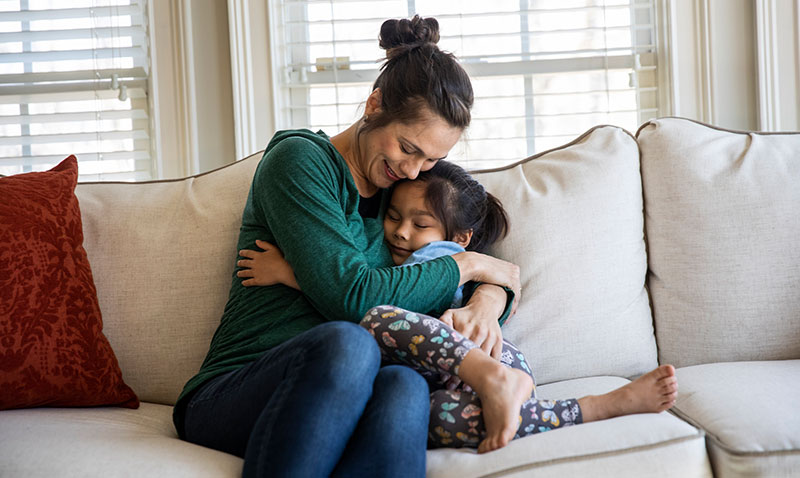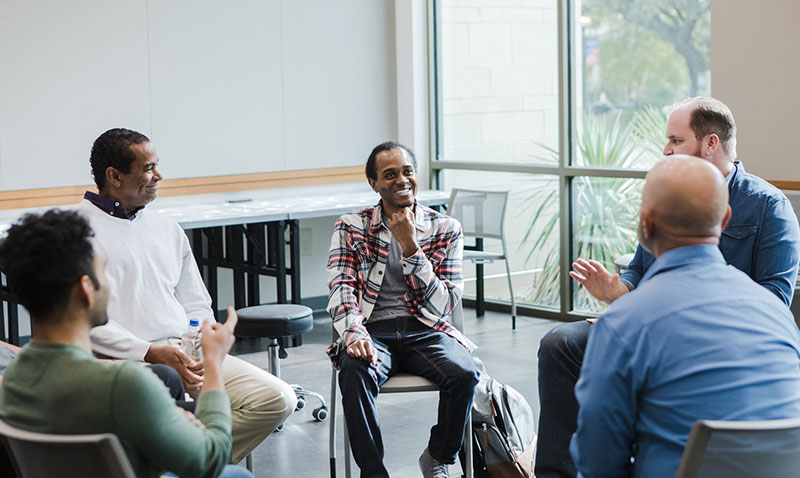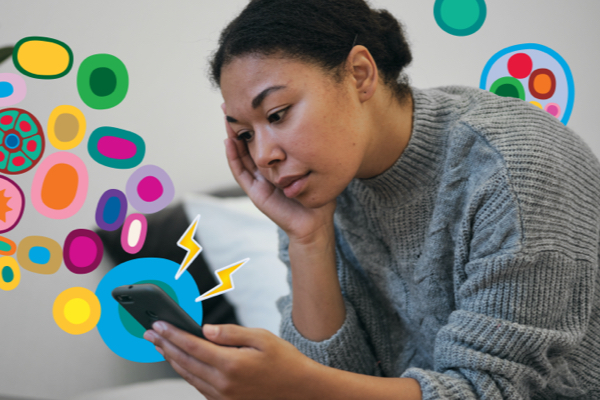Written by Kim Thomson
August 2023
If you’ve ever been to therapy, you’ll know it can work wonders. But have you ever considered doing it alongside other people? This is where peer support and group therapy programs come in.

Group therapy and peer support programs can help people work through a huge range of issues and life events — such as depression, anxiety, PTSD, addiction, health diagnoses, divorce, and chronic pain — by connecting with other people who have similar experiences.
We spoke to a practitioner about how group therapy programs work — and how you can find a group that suits you.
Understanding group therapy
Georgia Ashworth, clinical psychology registrar at Black Dog Institute, co-facilitates Black Dog’s Mood Management Course, a 10-week program designed for adults experiencing depression.
She’s also run chronic pain management groups, Acceptance and Commitment Therapy (ACT) groups for depression and anxiety, and been part of teams delivering Dialectical Behaviour Therapy (DBT) skills groups.
“Many people are sceptical of group therapy before commencing, which is understandable and entirely okay,” says Ashworth.
“It’s difficult to show vulnerability, especially in front of others, and change can be difficult; however, we often see this discomfort quickly disappear as connections grow and feelings that have felt immovable begin to shift.”
How does group therapy work?
“Compared to individual therapy, group therapy generally involves a more structured program with a focus on skills and strategy training,” says Ashworth.
“There is less focus on the stories of individuals, and more on education and effective changes that can be made.”
She says listening to the experience of others can be really helpful to better understand your own situation.
“Often it’s easier to recognise unhelpful ways of thinking and behaving in others before we can recognise it in ourselves.”
The Mood Management Course that Ashworth facilitates goes for 2 hours a week for 10 weeks, with a follow-up session 4 weeks later. Groups generally include 8 to 12 participants, with a mix of demographics and participants from all over Australia.
“The course is based on [cognitive behaviour therapy] principles, meaning there is a focus on exploring and changing unhelpful thought and behavioural patterns that drive symptoms of depression,” says Ashworth.
Ashworth says a core aspect of the course is encouraging participants to practise strategies in between sessions.
“To get the most out of a session, it’s best to be prepared, have your homework and worksheets ready to go and any questions you might like to ask,” she suggests.
“Openness to learning and practising new skills is also essential; the change process is difficult and implementing new skills can feel clunky at first, but being a part of a group is a supportive place to try new things … and make mistakes along the way.”
Ashworth says the nature of group therapy means strong bonds can be formed between members.
“When working in chronic pain, many of our group members were socially isolated and found it difficult to find others to relate to,” she says.
“Having a group of people to share experiences, encourage and keep each other accountable was invaluable.
“I would hear many stories of participants meeting up after the group and maintaining friendships long after it had concluded.”
How to find a group therapy support session
“Speaking with your GP is the best place to start,” says Ashworth.
“They can provide options based on what they think would be most helpful, and they can also provide a referral that may help to reduce costs.”
If you have a therapist or local mental health service, they may be able to steer you in the direction of an appropriate group. You should be able to find both online and in-person options.
And if you are a Medibank health insurance member you can call 24/7 Medibank Mental Health Support to help you find services in that area.~
When is group therapy not appropriate?
Ashworth cautions that group therapy may not be suitable in all circumstances.
“This includes if someone is currently suicidal or experiencing psychosis, if they have an intellectual disability that would impact capacity to engage with the content, and particular types of personalities that would benefit more from individual sessions,” she says.
24/7 Medibank Mental Health Support
Medibank health insurance members can chat to a mental health professional about how they feel and ask questions about a range of mental health concerns for themselves or a loved one and get guidance on what they can do next. Chat online or call 1800 644 325 anytime of the day or night, 7 days a week at no extra cost.~

Related articles
Looking for something else?
Visit our Better Minds hub to find more tools and services.
Things you need to know
~ Some referred services may involve out of pocket costs and waiting periods may apply.
€ Not available for members with extras only cover, ambulance only cover, Overseas Student Health Cover or Overseas Workers or Visitors Health Cover.
While we hope you find this information helpful, please note that it is general in nature. It is not health advice, and is not tailored to meet your individual health needs. You should always consult a trusted health professional before making decisions about your health care. While we have prepared the information carefully, we can’t guarantee that it is accurate, complete or up-to-date. And while we may mention goods or services provided by others, we aren’t specifically endorsing them and can’t accept responsibility for them. For these reasons we are unable to accept responsibility for any loss that may be sustained from acting on this information (subject to applicable consumer guarantees).












